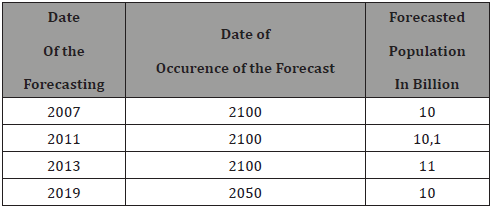 Mini Review
Mini Review
Time & the Forecast Drift
Patrice F Dassonville Department of Physics, France.
Received Date:January 24, 2019; Published Date:February 19, 2020
Abstract
Each specific event results from deterministic and stochastic events that mostly happen before this specific event. Such a causal sequence can hardly prevent forecast from drifting towards conjectural predictions.
Keywords: Future time; Contingency; Demography; Uncertainty la
Introduction
The need to know the future before others and the desire to be aware in advance, are commonly observed at all times of history. Knowing what will happen is providing serious benefits to everyone, including, astrologers, historians, politicians, economists, philosophers, military strategists. The causes of forecast drift dictate strict rules, in order to reduce the effects of a law of uncertainty.
Definition of the Future
The word « future » is used for designating two different things: either « avenir » (event that have not occurred yet »; or « future time » (when will that happen); it often designate both at once.
In « The Merchant of Venice », the English dramatist William Shakespeare (1564-1616) makes Lorenzo say : « ... but, in the end, truth will out » (Act II, Scene II, 88) : « truth » is the event expected by Lorenzo, and « end » designates « future time ». In « Macbeth », Shakespeare makes the king say: « The greatest is behind » (Act I, Scene III, 116): is this assertion a prediction or a forecast?
In « Life of Cato-the-Young », the Greek biographer Plutarch (c.46-c.125) reminds the advice of Cato to Cicero, who is disputed : « cedere tempore » (35, 1) that can be translated by « give in to the circumstances » ; in other words: « don’t fight and thus save the country » ; « tempore » means « events » instead of « time ».
The Precursors of the Forecast
Forerunner sign, prophecy, oracle, predicting, astrology, prognostication, prognostic, vaticination, clairvoyance, worship, ecstasy, fate, destiny, omen, providence, prayer, luck, fortune, presage, premonitory dream, are among numerous precursors of forecasting. In Rome, the augurs were priests assigned to the omens. The Latin word « fatum » (fatality, destiny) means the belief according to which future events are decided in advance, including the most innocuous events. In « Life of Coriolan », Plutarch reports: « they would put their hopes especially in time and in unforeseen strokes of luck » (32, 4).
The French Nostradamus (1503-1566) is the most famous astrologer in History. Unfortunately, his texts are quite obscure. Then, the analysis consists in making the interpretation of an enigmatic text coincide with one event among thousands. A great deal of major events of all kinds, like wars and natural disasters, occur regularly again and again, so that many of them can comply with predictions of Nostradamus, thanks to flexible and complacent interpretations. It allows supporters to point out how much the astrologer was farseeing.
The predictions of Nostradamus don’t work out with verifiable contemporary events.
In « Life of Demosthenes », Plutarch reports that the Greek politicians Pericles (c.495-429) and Demosthenes (384-322) did not believe in prophecies and oracles (20, 1).
The Prediction
To predict is quite similar to guess. Expectation, forecast, schedule, anticipation, planning, prediction, assumption, do not concern time; they concern subsequent events that we try to identify, to cause or to avoid; it is important not to confuse these events with « future time », which is a concept of temporality. We can forecast « future time » but not « future events »: it is easy to calculate what day of the week will be June 17, 2053, but nobody knows what will happen in London on that day, if it will rain in Paris or not, or what will be the value of the Dow Jones index, if still existing.
In « Ancient History of the Jews », the Jewish historian and politician Flavius Josephus wrote that it was easier to avoid hazard by a wise foresight rather than trying to recover after drop (Book III, II). In « The Peloponnesian War », Thucydides reports that for Pericles, « the fluctuations of events were as unpredictable as men » (Ch. I, 140); and he mentions « the unexpected events which thwart plans of humans » (Ch. VIII, 24).
Soon or late, Venice will belong to the field of submarine archaeology: obviously, it’s impossible to guess when, and fortunately, it’s not a certitude yet. Therefore, this assertion is rather a foretelling than a scientific forecast.
The Forecast Drift
A good and safety governing requests from deciders to have a political outlook, a permanent overview of future events, in order to allow deciders to correct errors of orientation, to prevent fatal drifts, to avoid irreversible trends.
Forecasting models are built by scrutinizing past events, by extending present events, and by introducing weighted probable data. The trends established with statistical mathematical models, become precarious in reason of the unavoidable inaccuracy of measurements, the contingency of many events, the active factors still unknown, the accumulation of infinitesimal factors, the unpredictable political or social crises, the unexpected natural or industrial disasters: the prolongation of an erratic curve ensures failure, because events diverge from the most meticulous forecasts, as and when one moves away from now. For example, when stochastic events take precedence over deterministic events, the art of forecasting becomes quite adventurous.
We have another example with the demographic forecasts: in 2005, the world’s population was 6.5 billion. In 2007 demographers predicted the start of a demographic decline before late twenty first century. But in 2011, the Population Reference Bureau [1-5] readjusted its predictions from 10 to 10.1 billion for 2100. In 2012, the population was 7 billion. In June 2013, the prediction of 2011 was increased to 11 billion for 2100. In June 2019, the outlook published by the Population Reference Bureau is 10 billion in 2050 (Table 1).
Table 1: Example of erratic forecasts.

Forecasters are admired for their assumed clear-sightedness, but they are still absent at maturity of their forecasts. Future events are imaginary: try to predict the level of the climatic migrations in 2050, or how the way of life will be in fifty years, are fictions. The drift of forecast is not caused by time. If a forecast is not realized, it is partly because of unforeseen events, it is also because the forecaster failed. By paraphrazing the Dutch philosopher Baruch Spinosa (1632-1677): what a forecaster tells about the future, tells more about him than about the future.
Outlook & Overview
Effective management of an enterprise as well as a government requires policy makers to have a political outlook, a permanent overview of future events, in order to allow political leaders to correct errors of orientation, to prevent fatal drifts, to avoid irreversible trends, and to make the appropriate decisions.
For example, the stock market outlook is a targeted diagnosis and short-term forecasting done by independent rating agencies; in that purpose, these agencies collect information and data from companies, governments and specialized institutions. The results, often weighted by a reliability index, are substancial under conditions such as short-term, high number of concerned data, data accuracy. As an illustration, in 2011 the financial data provided by the Greek government, in order to borrow money from the European Community, has hidden for a while a serious prospect of bankrupt of its economy.
Once again, « short term » and « for a while » does not mean that time is a threat to the forecast: the disruptions of the forecast are caused by inaccurate data, falsified information, stochastic events, weakness of modulization, etc.
The Breach of the Causality Principle
One usely thinks that the effect happens after the cause. It’s wrong in many cases; two examples:
She’s packing her bag today because she’s flying tomorrow: the effect (packing the bag) happens before the cause (the flight).
Climate threats are forcing us, today, to reduce emissions of carbon, in order to avoid an ecological disaster by the end of the century: the effect (reducing carbon emission) is taking place before the cause (prospect of ecological disaster). Breach of the causality principle comes in addition to the difficulties of the forecast.
An Uncertainty Law
Projections seem to be governed by an unavoidable uncertainty principle, which is well known in physics: according to the Uncertainty Principle of the German physicist Werner Eisenberg (1901-1976), the position and the velocity of a particle are known with inversely proportional accuracies. Such a principle applied to the forecasting would give: the further the date is, the less the accuracy is great. In other words, the accuracy on the forecast decreases when the date moves away.
Forecasting has gradualy become a sophisticated technic, by processing a great deal of information in a shorter and shorter delay. Of course, the reliability of the forecasts is strictly related to the number and the quality of the data processed, and under an unavoidable uncertainty. It would probably be presomptuous to decide if long term overviews of the future events are possible or if projections remain elusive fictions.
Acknowledgement
None.
Conflicts of Interest
No Conflicts of Interest.
References
- Shakespeare W The complete works of William Shakespeare. London Oxford University Press, Amen House, London.
- Plutarch Vies Parallèles (Parallel Lives). Robert Laffont (ed), London.
- Flavius Josephus Ancient History of the Jews. Ancient History of the Jews (ed) Lidis.
- Thucydides The Peloponnesian War. The Peloponnese War Folio Classique, Gallimard.
- Population Reference Bureau - United Nations Organization.
-
Patrice F D. Time & the Forecast Drift. Arch Biomed Eng & Biotechnol. 3(5): 2020. ABEB.MS.ID.000573.
-
Future time, Contingency, Demography, Uncertainty law, Forerunner sign, Prophecy, Oracle, Predicting, Astrology, Prognostication, prognostic, Vaticination, Clairvoyance, Worship, Ecstasy, Fate, Destiny
-

This work is licensed under a Creative Commons Attribution-NonCommercial 4.0 International License.






